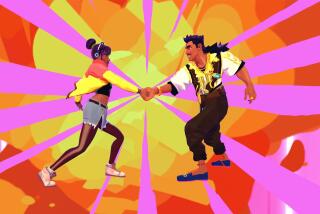Book review: ‘Reality Is Broken’
Reality Is Broken
Why Games Make Us Better and How They Can Change the World
Jane McGonigal
Penguin Press: 388 pp., $26.95
As a nongamer, avowed Luddite and mother of a 7-year-old who is mesmerically attracted to anything with a screen, I was skeptical about the message in “Reality Is Broken.” But Jane McGonigal is worth hearing out — her point in this provocative manifesto is that the energy and devotion that gamers pour into video games is a powerful force and that we are fools if we fail to harness it. Instead of dismissing games as frivolous entertainment or trying to unplug our children, we should take a close look at what games provide and figure out how to make reality as exciting and rewarding — as “gameful” — as the virtual world.
Any good game, explains the author, director of game research at the Institute for the Future, a nonprofit research group based in Palo Alto, includes a specific goal, clearly defined rules, motivating feedback and players who engage knowingly and voluntarily with these elements. Whether on a soccer field or in front of a computer, a goal provides a sense of purpose, rules foster strategy and creativity, feedback keeps you going and those who choose to play are, by definition, enthusiastic. A well-designed game creates the euphoria of flow, the kind of positive stress that invigorates like the exhilaration of performance in Rock Band. It gives us what game designers call “fiero,” from the Italian for “proud”: the urge to thrust a triumphant fist in the air and yell.
McGonigal leads us through the greatest hits of MMORPGs (massively multiplayer online role-playing games) and their hidden benefits: the satisfying quests of World of Warcraft, the chance to connect casually with friends in FarmVille, the awe-inspiring epic scale of Halo. Not only do these games attract legions of devoted players, she points out, but those players also invest an astonishing amount of effort in sharing their hard-won expertise: the WoWWiki created by World of Warcraft fans comprises a quarter of a million articles, second in size only to Wikipedia.
Which brings McGonigal to her larger mission: the engineering of “alternate reality games” that infuse real life with deep play. Some of these have humble goals, such as Chore Wars, in which players earn points for their online avatars by completing real-life adventures such as cleaning the bathtub and taking out the recycling. Others, such as the New York City charter school Quest to Learn, aim to make gamefulness a new basis for everyday life: Instead of competing for grades, students complete personal and collaborative quests, trying to “level up” in math, science, English, history and so on.
Occasionally, McGonigal’s enthusiasm seems misdirected toward embarrassingly first-world problems — do we really need a MMORPG to alleviate the “daily suffering” of business travelers trapped in airplane seats? But she builds to a compelling climax: If millions of players are enthralled by the chance to practice “planet craft” in “god games” such as Spore or the Sims, why not apply all that energized, networked engagement to thinking about the fate of our nonvirtual world? “When enough people play a game,” McGonigal writes, “it becomes a massively collaborative study of a problem.” In 2007, when the Corporation for Public Broadcasting funded the simulated forecasting game World Without Oil, about 2,000 people signed up. Playing daily over the course of a month, they generated thousands of pages of activist strategies for a future without fossil fuel.
I may be a Luddite, but I’m not obtuse. McGonigal marshals convincing evidence in smart and snappy prose, delivered in an old-fashioned book for techno-peasants such as me. Maybe I’ll let my son get online a little more often.
Nimura is a book critic and essayist.
More to Read
The biggest entertainment stories
Get our big stories about Hollywood, film, television, music, arts, culture and more right in your inbox as soon as they publish.
You may occasionally receive promotional content from the Los Angeles Times.










